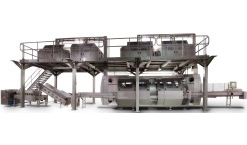

Fatal food-borne disease outbreaks and costly product recalls have undeniably left a big stain on the North American meat industry’s image in recent years, but thanks to companies like the Stoney Creek, Ont.-based Gridpath Solutions Inc., not having the right technology to prevent a food safety disaster should no longer ever count as a valid excuse for substandard due diligence.
Actually, the so-called HPP (high-pressure pasteurizing)—a nondestructive means of eliminating harmful bacteria, viruses and other microorganisms in prepackaged foods with application of high pressure—has now been commericaly available to meat processors for over a decade, according to Gridpath president Rick Marshall, albeit its relatively high cost has held back widespread industry acceptance.
Until now, Marshall asserts.
“The most important factor to realize about HPP is that it doesn’t crush anything,” explains Marshall. “Instead, it ‘de-natures’ proteins to create an environment so harsh that living organisms simply cannot metabolize.
“After relieving the pressure, returning it to normal, an organism’s cellwall will have lost its integrity—meaning it is dead.
“In light of a changing regulatory environment with an enhanced focus on food safety, it’s an effective means for manufacturers of stopping the problem in the ready-to-eat packaged foods industry once and for all,” Marshall told Canadian Packaging on a recent visit to the company’s 19,000-square-foot workshop, where 14 full-time and part-time employees make and service subsystems and devices used for moving products in and out of HPP presses.
Says Marshall: “Along with the obvious safety issue, there is also the allure of being able to provide your customers with products that not only taste better, but have a fresher texture, color and higher nutritional value—plus there’s the added bonus of it being able to provide a much longer shelf-life. What more could food processors want?”
According to Marshall, HPP raises food safety a couple of notches above the now-common MAP (modified-atmosphere packaging) process—using gas-flushing techniques to extend shelf-life—because the organoleptic (sensory) properties of a product are maintained for a much longer time.
Since the spoilage organisms are destroyed with the product already safely sealed within the package, he explains, all the risk of post-process contamination is removed from the equation.
Having once worked with a U.S.-based manufacturer of ultra-high pressure waterjet pumps and tooling that are widely utilized in HPP systems, Marshall founded Gridpath in 2003 to manufacture a range of standard products used in HPP process integration: pre-feeder elevator hoppers, package drain and dry stations, UV (ultraviolet) units, and validation systems.
Advertisement

